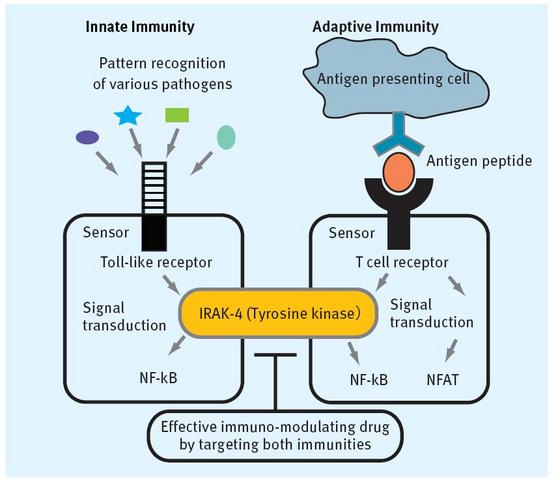Jun. 29, 2006 Research Highlight Biology Medicine / Disease
A common key regulator for both of two immunities
IRAK-4, an important immune defence protein, signals for both innate and adaptive immune responses.
 Figure 1: The role of IRAK-4 in innate and adaptive immunity
Figure 1: The role of IRAK-4 in innate and adaptive immunity
The immune responses are classified as either 'innate' or 'adaptive'. Innate responses rapidly detect and defend against invading pathogens. Adaptive responses act later, and ensure that the immune system 'remembers' invading pathogens, so that the body is equipped to respond more rapidly should the same pathogen be encountered again. Cells participating in both innate and adaptive immune responses express an array of receptors on their surface, which are able to 'sense' components of dangerous pathogens. Once triggered, each receptor activates a cascade of intracellular molecules that transmit stimulatory signals deep into the cell interior, which ultimately results in expression of defence genes.
At the RIKEN Research Center for Allergy and Immunology in Yokohama, Japan, Takashi Saito and colleagues demonstrated that IRAK-4, an intracellular molecule well-established as essential for transmission of signals in innate responses, also plays a crucial role in transmitting signals in adaptive responses, specifically in one type of adaptive cell, the T cell.
To gauge the role of IRAK-4 in T cell signalling, Saito and colleagues subjected IRAK-4-deficient T cells to a battery of immune function tests. In response to viral infection, normal T cells either mature into 'killer' cells capable of eliminating infected cells, or secrete defensive molecules called cytokines. IRAK-4-deficient T cells exhibited defective killing activity and cytokine production. Because T cells in transplant recipients perceive donor tissue as 'foreign', graft rejection occurs. Compared to normal recipients, IRAK-4-deficient recipients showed delayed rejection of foreign skin grafts. By monitoring the activation status of T cell signalling molecules, the researchers traced these abnormalities to defective activation of NF-κB, a factor required for expression of defence genes. Importantly, these defects occurred even when IRAK- 4-deficient T cells were placed in an otherwise normal immune system.
Previous studies identified 'adaptive' roles for two proteins, RIP2 and TRAF6, which were established participants in 'innate' signalling cascades. These studies, together with the study of Saito and colleagues, illustrate that the distinction between molecules contributing to innate and adaptive immune responses may not be as sharp as previously thought. Innate and adaptive responses work in concert towards the common goal of defending the body against immune insults. Exactly how both arms of the immune system came to exploit the multifunctional IRAK-4 protein remains to be determined.
References
- 1. Suzuki, N. et al., A critical role for the innate immune signaling molecule IRAK-4 in T cell activation. Science 311, 1927-1932 (2006). doi: 10.1126/science.1124256
